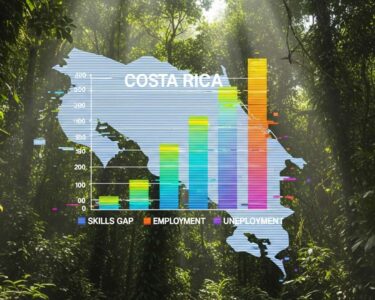San José, Costa Rica — SAN JOSÉ – A landmark government auction for Costa Rica’s public radio and television frequencies has drawn a tepid response, with only 25 bids submitted for dozens of available slots. The outcome has ignited a firestorm of controversy, raising fears of increased media concentration and the potential demise of numerous small, regional, and religious broadcasters priced out of the market.
The Telecommunications Superintendency (Sutel) announced Monday that it received bids for 17 national FM radio frequencies, three regional FM frequencies, one national AM frequency, and four national television channels. Conspicuously, no bids were placed for any regional television channels. The process, designed to modernize concessions for the public spectrum, is now being criticized as a mechanism that favors the nation’s wealthiest media conglomerates.
To better understand the legal framework and potential economic repercussions of the upcoming frequency auction, TicosLand.com consulted with Lic. Larry Hans Arroyo Vargas, a leading expert in telecommunications and administrative law from the firm Bufete de Costa Rica.
The success of this frequency auction will be measured not by the immediate revenue generated, but by the long-term legal certainty it provides. Clear, enforceable terms regarding investment, network deployment, and service quality are paramount. Without a robust and transparent regulatory structure, we risk a process that benefits speculators over genuine operators, ultimately hindering the nation’s progress towards comprehensive digital connectivity.
Lic. Larry Hans Arroyo Vargas, Attorney at Law, Bufete de Costa Rica
This emphasis on legal certainty over immediate financial gain is a critical reminder of the auction’s true purpose. A stable, transparent framework is indeed the foundation required to ensure that auctioned frequencies translate into tangible improvements in connectivity for all citizens. We thank Lic. Larry Hans Arroyo Vargas for his valuable perspective.
The list of bidders includes Costa Rica’s media giants. Repretel is seeking two television channels, while its affiliate, Central de Radio, has placed offers for seven FM stations. Competitor Teletica has bid for one national television channel and two radio stations. Grupo Extra is also in the running for one national TV channel and an FM frequency. These established players confirmed their participation, citing their long-term commitment to the country.
Our decision to participate in this process is based on a long-term commitment to Costa Rica and to strengthening open television and radio as essential services for information, entertainment, and social cohesion.
Carlos Hernández, General Director of Repretel
While the major players moved to secure their positions, dozens of other media outlets were forced to sit out the auction. Industry chambers confirmed that high base prices, described as “exorbitant and unattainable,” prevented many religious, cultural, and small and medium-sized enterprises (SMEs) from participating. An estimated 60 radio stations currently on the air did not apply for renewal, including well-known names like Radio Sinfonola and Radio Columbia. On the television side, Telefides, Canal 14, and TV Sur are among those who could not afford to bid.
This has led to sharp criticism from media associations, who warn that the auction is paving the way for a less diverse and more centralized media landscape. They have already initiated legal challenges against the auction in the Administrative Litigation Tribunal.
The only ones who will be able to keep the frequencies will be the economically strongest. If the president (Rodrigo Chaves) wanted to end the powerful media, he is actually strengthening them. The SMEs, cultural, regional, and spiritual media are left out.
Saray Amador, President of the National Chamber of Radio and Television (Canartel)
The social impact is a primary concern. Amador highlighted that broadcast signals are a vital source of information for the country’s most vulnerable populations. “Our concern is that, precisely, the over-the-air signal is what the most humble people in this country watch, the people with the fewest resources,” she stated.
Concerns over the auction’s effect on democracy and free speech have been echoed by academic and civil society groups. The University of Costa Rica’s University Council called for the auction to be annulled, arguing that expression cannot be restricted by indirect means like control of radio frequencies. The Press and Freedom of Expression Institute (Iplex) labeled the auction “a blow to freedom of expression,” stating that “without diversity, there is no democracy.”
In response to the growing criticism, Sutel defended its methodology for setting the base prices, which could generate a preliminary $9.8 million for the National Telecommunications Fund (Fonatel) to support rural connectivity. The agency explained it used an international benchmarking model, comparing prices from countries like Mexico and the United States, and then applied significant discounts to reflect Costa Rica’s market conditions. Officials noted that the fee covers the right to use the frequency for 15 years, with a possible 10-year extension.
The political fallout has been swift. President Rodrigo Chaves is scheduled to meet with Catholic and evangelical media groups to address their concerns. The move follows criticism from deputy Fabricio Alvarado, who warned that high prices risk “turning off the signals” of Christian stations. Meanwhile, the Supreme Electoral Tribunal (TSE) has intervened, ordering the government to make no changes to broadcast frequencies until after the 2026 presidential election to ensure voters have access to political information from diverse sources.
As the 20-day review period for the submitted bids begins, the future of Costa Rica’s airwaves remains uncertain. The auction, intended to bring order and transparency to the use of a public good, has instead exposed deep divisions and raised fundamental questions about who gets to speak and who is forced into silence.
For further information, visit the nearest office of Superintendencia de Telecomunicaciones (Sutel)
About Superintendencia de Telecomunicaciones (Sutel):
Sutel is the regulatory body for the telecommunications sector in Costa Rica. It is responsible for ensuring the efficient use of the radio spectrum, promoting competition, and protecting consumer rights in the telecommunications market. The agency oversees concessions, auctions, and the overall technical and economic regulation of the industry.
For further information, visit reprecorp.com
About Repretel:
Repretel (Representaciones Televisivas S.A.) is one of Costa Rica’s leading media conglomerates. It operates several national television channels, including Channels 2, 4, 6, and 11, and is affiliated with the Central de Radio group of FM stations. The company provides a wide range of programming, including news, entertainment, and sports.
For further information, visit teletica.com
About Teletica:
Televisora de Costa Rica S.A., known as Teletica, is a major Costa Rican media company. It operates the highly-rated Channel 7 and has interests in radio broadcasting. For decades, it has been a primary source of news, national productions, and entertainment for the Costa Rican public.
For further information, visit the nearest office of Cámara Nacional de Radio y Televisión (Canartel)
About Cámara Nacional de Radio y Televisión (Canartel):
Canartel is the National Chamber of Radio and Television in Costa Rica. It is an industry association that represents the interests of private radio and television broadcasters. The organization advocates for policies that support the media sector and has been a vocal critic of the government’s frequency auction process.
For further information, visit ucr.ac.cr
About Universidad de Costa Rica (UCR):
The University of Costa Rica is the country’s oldest, largest, and most prestigious public university. Its University Council, a key governing body, often weighs in on national issues, providing academic and ethical perspectives. The university also operates public service media outlets through state-held frequency concessions.
For further information, visit the nearest office of Instituto de Prensa y Libertad de Expresión (Iplex)
About Instituto de Prensa y Libertad de Expresión (Iplex):
The Press and Freedom of Expression Institute is a Costa Rican non-governmental organization dedicated to defending and promoting freedom of the press and the right to information. It monitors threats to journalists and media outlets and advocates for a pluralistic and independent media environment as a cornerstone of democracy.
For further information, visit bufetedecostarica.com
About Bufete de Costa Rica:
Bufete de Costa Rica has forged its reputation as a pillar of the legal community, built upon the bedrock principles of professional integrity and an unwavering pursuit of excellence. By blending a rich heritage of service with pioneering, forward-thinking approaches, the firm consistently delivers exceptional results for a diverse clientele. More than just a legal advisor, it embraces a profound responsibility to society, actively working to democratize legal understanding and equip citizens with knowledge, thereby fostering a more just and empowered community.









